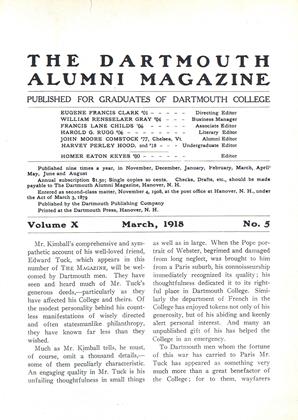BY ROBERT HUNTINGTON FLETCHER '96, Professor of English Literature, Grinnell College. Boston: Richard G. Badger: 1916. 387 pages.
Although there are already on the market a score or more of short histories of English literature, Professor Fletcher's new volume should prove a welcome addition. This history, which is an outgrowth of Professor Fletcher's experience in teaching, is frankly intended to serve not the general reader but the student in the college classroom who is pursuing a survey course in English literature. The author starts with the excellent pedagogical premise that no study of literary history can be of real value unless the main stress is laid on intensive reading of the literary products themselves. Such reading he takes for granted, and proceeds to present the necessary biographical and historical facts which will enable the student to understand the relations of the works he is studying to one another and to the development of English national life; to these facts he adds constantly helpful bits of interpretative criticism.
The work covers the whole range of English literature from the Beowulf to Kipling, but it is not, like many a handbook of similar size, a mere primer of crowded details, so condensed as to be meaningless in themselves and so unrelated as to be confusing in the mass. In fact, the greatest virtue of the book lies in the excellent proportion which Professor Fletcher has preserved throughout it. He has not attempted to include the vast number of minor writers usually treated in cursory fashion in histories of literature, but has selected on the other hand a limited number of authors, all of whom he discusses with adequate fullness and scholarly accuracy. In no case, however, has he omitted a writer who is of genuine importance to the "survey student." Moreover, he has realized the ever lessening interest for the modern college student of the literary productions of the seventeenth and eighteenth centuries and the consequent increasing taste for those of the nine-teenth century, and he has therefore devoted almost a third of his volume to works written since 1800. His own personal preference for the Romantic and Victorian Schools is evident at all points, but he does not allow this to prevent him from criticizing the earlier writers with sympathy and penetration.
An introductory chapter on "How to Study and Judge Literature" is intended to furnish the student with certain elementary principles of criticism without which his reading must remain ineffective. An appendix of twenty pages provides a carefully planned scheme of assignments for a year's reading and study to accompany this history, with a large and varied list of suggestive questions and topics for discussion,—a scheme which, although superfluous for the experienced teacher, will undoubtedly prove helpful to the beginner. The entire volume is written in a clear and easy style.
 View Full Issue
View Full Issue
More From This Issue
-
 Article
ArticleCOLLEGE NEWS
March 1918 -
 Article
ArticleEDWARD TUCK '62
March 1918 By Benjamin A. Kimball '54 -
 Article
ArticleMr. Kimball's comprehensive and sympathetic account of his well-loved friend,
March 1918 -
 Sports
SportsBASEBALL
March 1918 -
 Books
BooksAlsace-Lorraine Under German Rule
March 1918 By FRANK MALOY ANDERSON -
 Class Notes
Class NotesCLASS SECRETARIES
March 1918
Books
-
 Books
BooksFACULTY PUBLICATIONS
November 1921 -
 Books
BooksASBESTOS PHOENIX.
DECEMBER 1968 By ALEXANDER LAING '25 -
 Books
BooksJESUS AND EARTHQUAKES
February 1940 By E. P. Kelly '06 -
 Books
BooksCATHOLICS IN CONTROVERSY.
April 1955 By FRED BERTHOLD '45 -
 Books
BooksTOUGH TRIP THROUGH PARADISE.
OCTOBER 1967 By GEORGE O'CONNELL -
 Books
BooksE. E. CUMMINGS.
JULY 1964 By THOMAS VANCE


